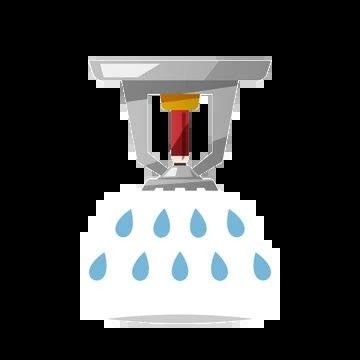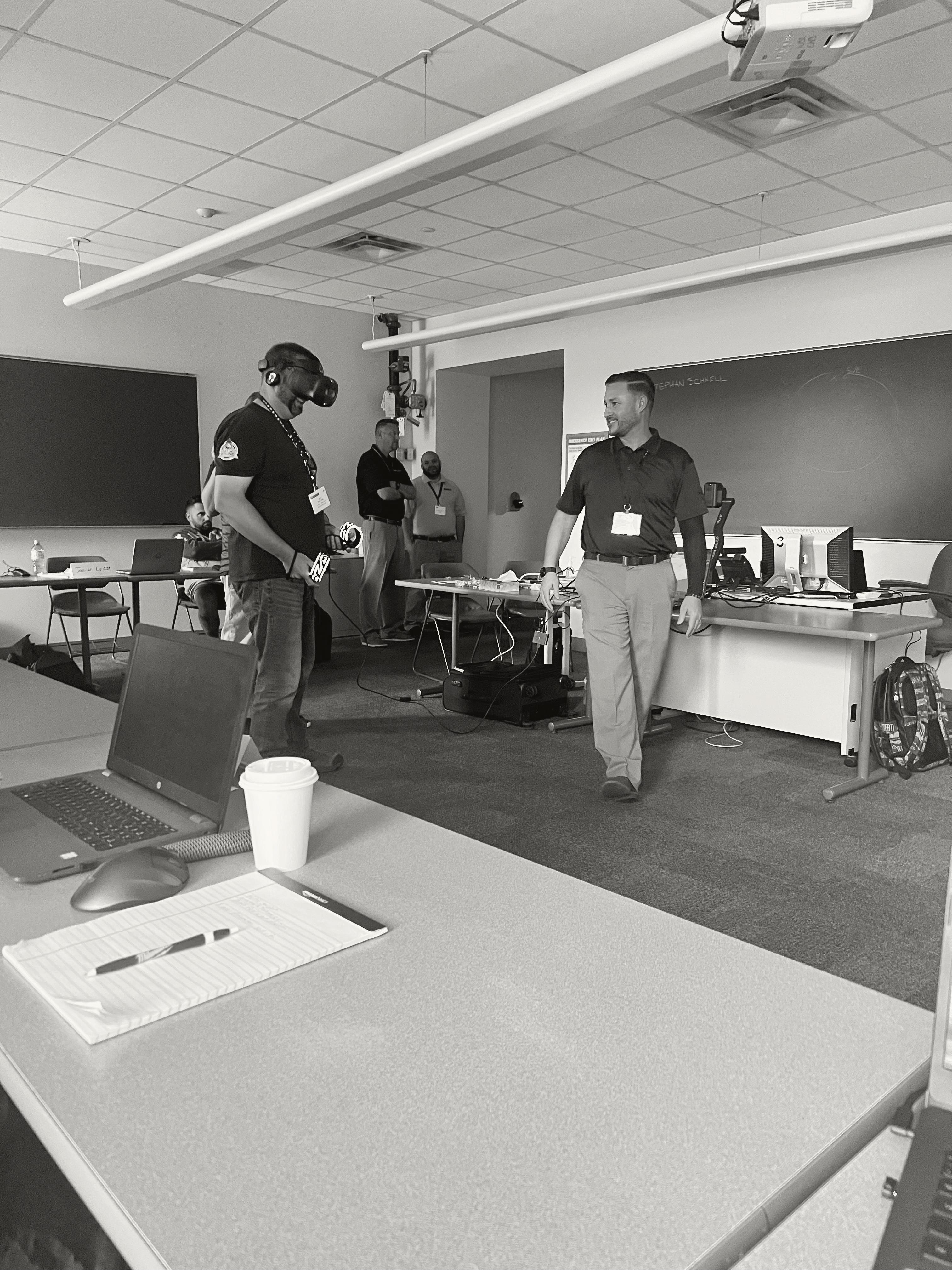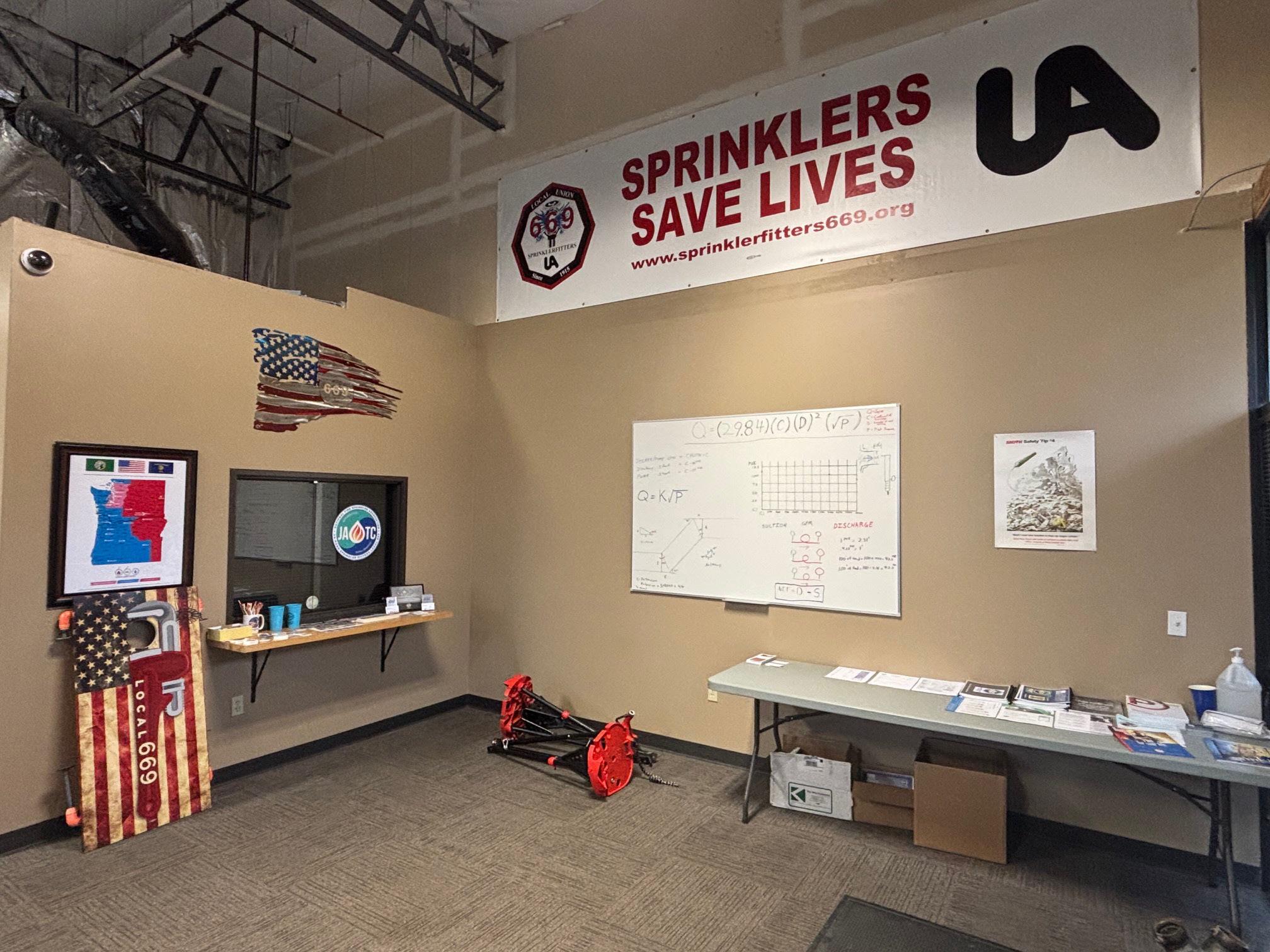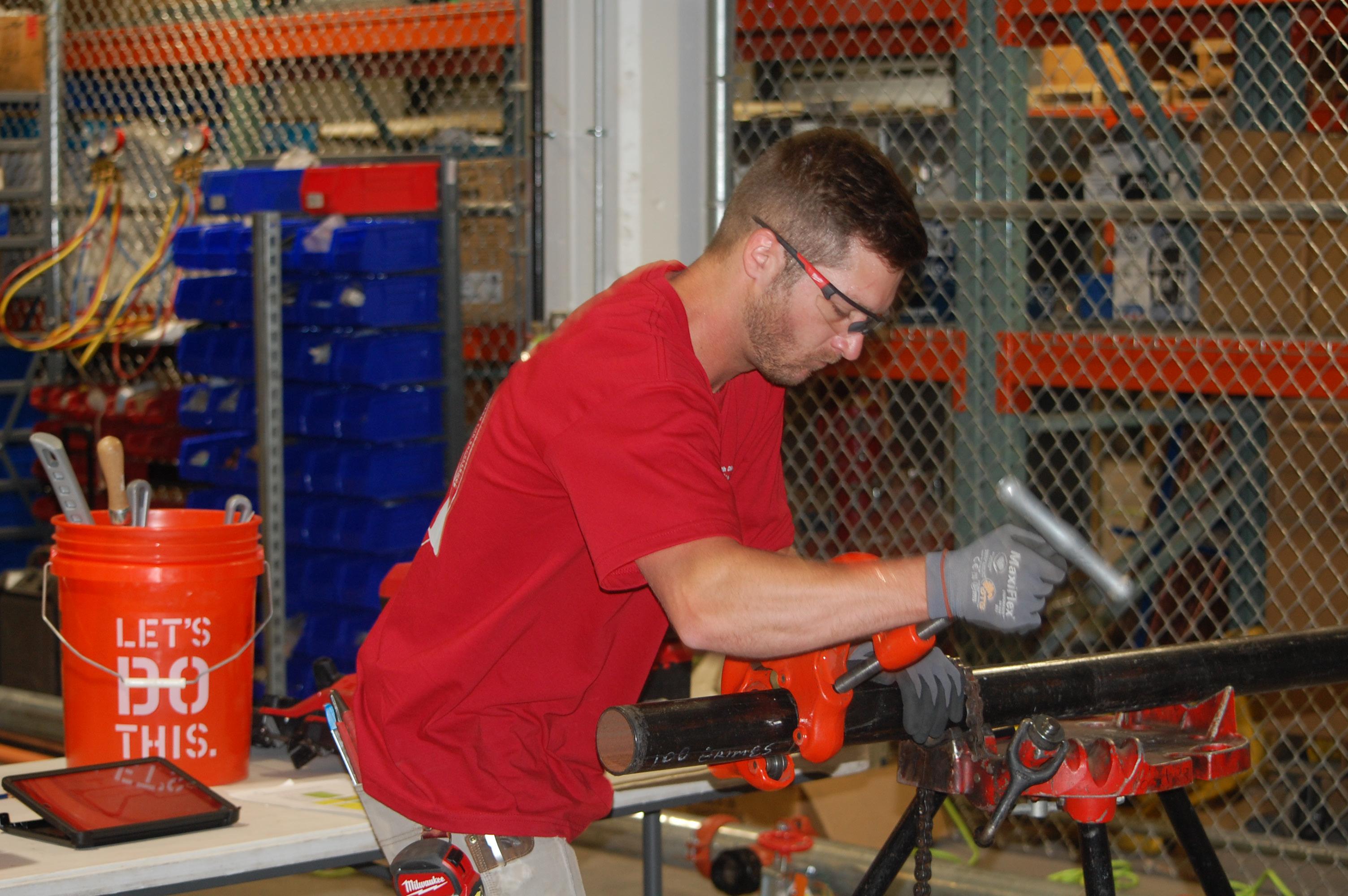





Rita L. Neiderheiser


2024 Martin P. Durkin
Lifetime Achievement Award recipient





2024 Jack Walsh Award for Instructor of the Year














Message from the Executive Director
Message from the Director of Training
SPF Course Updates
OSHA Training
Backflow Training
The Importance of Mentorship, Training, and Career Preparation in Apprenticeship
669 Apprentice Contest Winner
Instructor Spotlight
2025 Class Topics
JATC Class Locations





Who is the Joint Apprenticeship and Training Committee (JATC)? We are an equal representation of Contractor representatives from the National Fire Sprinkler Association (NFSA), and Local Union 669 elected representatives. These two organizations make up the Leadership of the JATC, and they hire a director to run the day-to-day operations of the entire training department. This position is the Executive Director of Education and Training. The director comes from the industry as a working member, and there have only been four full-time Directors in our history (1953-2025). The JATC leadership is not recognized as often as they should be for their hard work and countless hours working for apprenticeship.

Labor
Kris Winget (Financial Secretary-Treasurer 669)
Scott Moser (BA, Eastern PA)
Jim Buckley (BA, Michigan)
Ben Hogan (BA, TN and NC)
Todd Barry (BA, Southern CA)
Lance Gunnells (Director of Labor Relations NFSA)
Joe DePriest (Western States FP)
Jimmy Twining (Patriot FP)
Ryan Girten (Shambaugh and Son)
Open seat (TBD)

Beyond the JATC Leadership Team is our Instructional Leadership Team. We have a team of full-time coordinators who are providing structure and support to our part-time field instructional staff. Enclosed you will hear from our some of our team members and their successes. We will continue to showcase different aspects of our training initiatives. This newsletter will be a place to see more in-depth of what and how the training department is providing opportunities to our members.
Jeff Van Rhyn, Director of Education and Training Operations
Rob Starcher, Instructional Curriculum and Codes Coordinator
Kevin Holbrook, Core Curriculum and Codes Coordinator
Michael Zurek, Technology and Codes Coordinator
Brian Downey, Specialty Classes and Journeyworker Coordinator
Ana Rigsby, Recruitment and Outreach Coordinator
Curtis Amos, Veterans in Piping (VIP) Instructor
Kyle Shrum, Veterans in Piping (VIP) Instructor

Beyond the Wrench, Turning Effort into Excellence! We are committed to providing the best education and training for sprinkler fitters nationwide.





Their expertise and energy have already begun making a positive impact, and we’re excited to see the contributions they will make in the coming years.

We’ve also created several new full-time roles to further enhance our training programs and outreach efforts. We’re excited to announce the following appointments in 2024:
• Brian Downey – Specialty Classes and Journeyworker Coordinator
• Michael Zurek – Technology and Codes Coordinator
• Ana Rigsby – Recruitment and Outreach Coordinator
• Kyle Shrum - 2nd VIP Instructor
Hired in 2022
• Kevin Holbrook – Core Curriculum and Codes Coordinator
• Rob Starcher – Instructional Curriculum and Codes Coordinator
These individuals bring a wealth of expertise and leadership to their new roles, and we look forward to seeing the impact they will have.
In 2024, twenty of our most talented apprentices achieved an extraordinary milestone by winning state apprenticeship contests. Two of them, Clayton Chalndler (WV) and Seth Bicksler (IL), making it to the finals of the International Apprenticeship Contest. Their success underscores the strength of our training programs and the potential of the next generation of industry leaders. It is with tremendous honor that we celebrate Seth Bicksler who was named the International Apprenticeship Contest Sprinkler Fitter Champion!
Additionally, we would like to congratulate Shannon Smith for being named 2024 Instructor of the Year. Shannon’s years of dedication and service to the training department have been invaluable, and this recognition is well-deserved. Thank you, Shannon, for your outstanding contributions!
As we celebrate these accomplishments, we remain focused on the road ahead. Our goal for the year ahead is to continue building on this momentum, expanding opportunities, and delivering exceptional training to apprentices and members across the nation.
We are grateful to everyone who has been part of this journey. Thank you for your hard work, support, and commitment to excellence. Here’s to another successful year ahead!








Over the last three years, the SPF revision team has worked diligently to update five SPF courses. The first two courses revised, SPF 11 and SPF 13, were made available for enrollment in May 2023.
Previously, SPF 11 covered Blueprint Reading, but it will now be combined with a drawing course to create a new Plan Reading course, scheduled for release later. The updated SPF 11 now focuses on Types of Water-Based Fire Protection Systems, a topic previously covered in the old SPF 13, and includes twelve lessons on wet, dry, preaction, deluge, foam, and water mist systems.
The new SPF 13 is a completely redesigned course on Fire Pump Installation, with eleven lessons covering an introduction to NFPA 20: Standard for the Installation of Stationary Pumps for Fire Protection, pump types, piping arrangements, installation requirements, and fire pump controllers.
In September 2024, we released updated versions of SPF 14, 15, and 16. The new SPF 14, previously SPF 16, focuses on Sprinkler System Alarms, with five lessons on alarm system basics, signal types, circuits, devices, and alarm panels.
SPF 15 is now a redesigned course on Standpipe Systems, featuring eight lessons on NFPA 14: Standard for the Installation of Standpipe and Hose Systems, system components, installation requirements, pressure-regulating devices, acceptance testing, commissioning, and requirements for buildings under construction.




Finally, SPF 16, previously SPF 14, now covers Special Hazard Systems, with eight lessons exploring CO₂ systems, clean agent systems, the Victaulic Vortex system, linear heat detection, VESDA, and fire extinguishers.
Apprentices will automatically be enrolled in the new courses if they haven’t completed the older versions. Members in good standing may also request enrollment in any of the 19 SPF courses by contacting the JATC office.
We’re continuing to update and replace the remaining courses to ensure apprentices are learning the latest in sprinkler technology.
Remember, the path to expertise is endless—never stop learning, and let’s keep advancing together in the ever-evolving sprinkler industry.


Kevin Holbrook
Kevin Holbrook Core Curriculum and Code Coordinator


I would like to introduce you to the JATC OSHA training team.
The OSHA team consists of a group of dedicated instructors who, in addition to their day jobs and teaching responsibilities, have stepped up to teach OSHA 30 construction courses. They offer both in-person and virtual online OSHA 30 classes at various JATC training sites across the country as needed.
The OSHA team has 11 OSHA outreach trainers:
◦ Brad Wilder (Syracuse, NY)
◦ Brian Payne (Lanham, MD)
◦ Brian Downey (Cicero, IN)
◦ Bob Chafee (Whittier, CA)
◦ Chris Fulkerson (Cloverdale, IN)
◦ Collin Michael (Phoenix, AZ)
◦ Kevin Holbrook (West Jefferson, OH)
◦ Kevin Vaughn (Spring Hill, TN)
◦ Sam Sanchez (Houston, TX)
◦ Shaun Martin (Willimantic, CT)
◦ Tony D’Iapico (Newton, IA)
The OSHA team in 2024 taught seven in-person OSHA 30 classes in the following locations:
• Mt. Pleasant, MI
• Phoenix, AZ
• Indiana, PA
• Rochester, NY
• Omaha, NE
• Austin, TX
• Des Moines, IA




In 2024, we conducted two virtual OSHA 30 classes.
Also in 2024, 138 members received their OSHA 30 completion cards, with a total of 608 members having earned these cards since 2021 through the above classes.
In-person OSHA 30 classes require a minimum of 20 students. They typically run from Friday to Monday (with some exceptions) and require a 60-day advance notice for approval and mailer distribution with class dates and times.
The OSHA 30 virtual class requires a minimum of 15 and a maximum of 20 students. The OSHA team is currently planning to offer another virtual OSHA 30 class in 2025 and is seeking interested participants.
To request an OSHA 30 class, contact Tony D’Iapico at tdiapico@jatc.org or text 515-321-9277.
For journeypersons and apprentices, there is also a third option: you can sign up for individual OSHA classes through the Local 669 website. Go to Training > JATC Links > OSHA Course Portal to register. (Or click here OSHA COURSE PORTAL)
I would like to thank all business agents, instructors, and the staff of 669 and the JATC for your commitment and dedication in supporting the OSHA team.
Working safely is a team effort!!
Sincerely,
Tony D'Iapico
OSHA Lead Instructor Local 669 JATC


Local 669’s Backflow Training Department is an approved provider for ASSE #5000 Cross Connection Control Tester Certification, as well as an approved state provider in Indiana, Nebraska, Ohio, and Wisconsin.
The ASSE certification is recognized in the following states:
Alabama Kansas Montana West Virginia
Alaska Kentucky Nevada Wyoming
Arizona Louisiana New Jersey
Arkansas Maine North Dakota
Colorado Michigan Oklahoma
Florida Minnesota Pennsylvania
Georgia Mississippi South Dakota
Iowa Missouri Virginia
As well as parts of California
The 2024 ASSE Backflow Training Staff
Ralph Young (Albany, NY)
Chris Fulkerson (Cloverdale, IN)
Nathan Owen (Louisville, KY)
Jody Scott (Madison, WI)
Rob Ivey (Canfield, OH)
Gary Engel (Plymouth, IN)
Johnnie Engelke (Omaha, NE)
Jeff Wilcheck (Anchorage, AK)

In 2024, we conducted classes in:
Lansing, MI
Denver, CO
Omaha, NE
Indianapolis, IN Minneapolis, MN
Ft. Wayne, IN Harmony, PA
Harrisburg, PA Huntington, WV
Oklahoma City, OK Louisville, KY Camdenton, MO
Tulsa, OK
Des Moines, IA Kaukauna, WI
Anchorage, AK Madison, WI
Cincinnati, OH
These classes resulted in certifications being issued to 144 new Testers and 149 renewals.
If you are interested in a course, contact your Local Business Agent to request a class from the JATC office. Most classes are limited to twelve attendees and must contain a minimum of eight members to hold a class.
Upon approval, the training staff will work with the Local Agent to finalize the details and set up the class.






From L to R: DuJuan "DJ" Price, Vice President; William Puhalla, Southern Region ABM; Robert J. Cooper Jr, Business Manager; Steven Purdy, Western Region ABM; Rita Neiderheiser; Mark O'Connor, Eastern Region ABM; Kristopher D. Winget, Secretary Treasurer; Charles Ketner, Exeutive Director of Training and Education; Carl J. Westby, President-Organizer


From L to R: Raymond Boyd, UA Director of Education and Training; Rita Neiderheiser; Mark McManus, UA General President





Each year we present the Martin P Durkin Lifetime Achievement Award to a well deserving individual who has demonstrated extraordinary dedication to education and training in the United Association.
This is an award named after UA General President who was the driving force behind the creation of the Instructor Training Program. The award is our way of recognizing extraordinary contributions and training made by individuals. It's our opportunity to say thank you and to honor those remarkable individuals.
This year's 2024 Award recipient has been a member of Sprinkler Fitters Local 669, with nearly 46 years of experience in the industry.
Starting in November 1978, she cultivated a diverse career path as a second generation sprinkler fitter. She has transitioned from apprentice to a company owner to JATC instructor to technical advisor for the local and UA master instructor, while maintaining a strong commitment to improving codes and educating others. From March 2003 through April 2009, she made history as the first female instructor working for Local 669 JATC program.
While initially teaching part-time, her potential was recognized by Business Manager John Bodine, who appointed her as a full-time technical advisor working for Local 669, and entrusted her with the role on the Local 669 JATC committee representing Labor in 2011.
Her contributions to the United Association have been substantial with her teaching engagement spanning across the United States.
She's played a pivotal role in the UA instructor training program in Ann Arbor, achieving the title of UA Master Instructor and earning an associate's degree from the same program.
As the Chair of the ASSE 15010, which focuses on ITM of automated fire sprinkler systems, a committee she helped establish, she continues to make a significant impact. Furthermore, she remains actively engaged on various NFPA committees. Her unwavering dedication and extensive experience and ongoing commitment to professional growth makes her a worthy recipient of the of the Martin P. Durkin Award.
It is my honor to present this year's 2024 Martin P. Durkin Award to Rita L. Niederheiser.


Written by Charles Ketner, Executive Director of Education and Training
The 2024 Jack Walsh Instructor of the Year Award is presented to Mr. Shannon Smith in recognition of his exceptional dedication, expertise, and service as an instructor. Shannon has been a cornerstone of our training program, teaching at our Portland, OR location, which is one of the most populated sites in the country with over 80 apprentices.
Shannon’s commitment to fostering the growth and development of his students is unparalleled. He consistently goes above and beyond to ensure that his apprentices receive the best possible training. His innovative teaching methods, deep industry knowledge, and passion for his craft have not only helped shape the careers of countless apprentices, but also inspired fellow instructors to elevate their own training efforts. His influence has left a lasting impact on the entire JATC organization.
Behind the scenes, Shannon works tirelessly to improve the training experience, spending countless personal hours researching new trade technologies and refining his teaching techniques. His efforts to challenge students and push them to reach their full potential are a testament to his unwavering commitment to excellence. He is also a trusted resource for solving trade-related issues and frequently contributes his expertise to initiatives such as the revision of the SPF courses.


"Shannon works tirelessly to improve the training experience"





In addition to his role as an instructor, Shannon serves as the lead instructor for the ASSE 15010 Inspections, Testing, and Maintenance Certification, which is a requirement in Washington for ITM work. His leadership in this area is invaluable, ensuring that our members are well-prepared to meet industry standards.

Shannon’s service extends beyond the classroom. A U.S. Marine Corps veteran, Shannon has been an advocate for veterans’ involvement in the trades, contributing to our recruitment video for veterans. His continued inspiration and quiet leadership motivate apprentices, fellow instructors, and myself to strive for continuous improvement.
Having taught since 2005, Shannon enters his 20th year as an instructor, making him one of the most tenured members of our training staff. His dedication and contributions have made an indelible mark on the program, and we are grateful for his ongoing commitment to shaping the future of the trade.









Written by 2024 Instructor of the Year, Shannon Smith
Apprenticeship is not just a pathway to a career—it’s the foundation of excellence in the fire protection industry. Our mission as instructors is to equip the next generation of skilled tradespeople with the knowledge, skills, and mindset needed to succeed in this critical field.
Having spent nearly 20 years teaching apprentices and 27 years working as a sprinkler fitter, I am deeply committed to fostering a culture of safety, quality, and continuous learning. My role as an instructor goes far beyond just teaching the basics; it’s about preparing apprentices for a successful, lifelong career.
Career preparation starts with consistency and dependability. For example, being on time and being in the physical and mental condition to perform the task at hand. The same thing goes for classes and lessons. If a person can’t do that, they will never succeed at work or in life. I lead by example, teaching apprentices to value craftsmanship and take pride in their work. Our work saves lives, and families depend on us doing our best every day.

To engage apprentices and ensure they understand the content, we use a mix of classroom materials such as videos, slideshows, props, questions, and quizzes. This multi-faceted approach helps reinforce lessons in a way that sticks with them. I also bring many real-world examples and physical devices for apprentices to examine, helping them connect theory to practice. Everyone can agree there is always a desire for more hands-on training. Our training emphasizes not just performing tasks but performing them to the highest standard. Safety is paramount, and perfection in every task is expected.
Another key lesson I instill in my apprentices is how to be resourceful. I encourage them to look up information and save it for future reference when encountering something new or unfamiliar. I’ve created extensive files in Google Documents that I share with them to help build their resources for troubleshooting and learning. I still have to look up technical information, whether for the current job, explaining the parts and repair process so the work can be correctly quoted, or helping others.
As an instructor, I strive to maintain the demeanor of an expert in my field. I have acquired and maintained every certification available to me, and I stress the importance of continual lifelong education. I tell my apprentices, “This isn’t just a job; it’s a career.” They need to recognize the importance of becoming experts in their trade.







In the fire protection industry expertise is essential. Maintaining a professional demeanor and striving to show our apprentices how important it is to become experts in the subject matter is crucial for all parties. I share my journey and stress the hard work and dedication it takes to get there. Apprentices must understand that success in this trade is built on the shoulders of those who came before us on a foundation of continual learning and mastery. My job is to teach the skills that journeymen may not have the time to pass on. I help apprentices learn how to figure things out on their own, stressing the importance of not just relying on Google searches but understanding how to find the correct information and apply it in real-world scenarios.
Clients pay top dollar for expertise. I emphasize that our employers can charge over $100 per hour because of the knowledge and skills they will develop in the field. They must take this responsibility seriously and understand the value of becoming highly skilled professionals. Every interaction with clients, colleagues, and the work itself, should reflect their commitment to excellence.
I encourage my apprentices to remember they are part of a proud tradition of excellence in the fire protection industry. By taking their training seriously and continuously striving to improve, they will contribute to the legacy of Local 669 which dates back to 1915. Apprenticeship is a continuous journey of growth. As I’ve shared with my apprentices, “Knowledge doesn’t stop once you become a journeyman.” Even after years of experience, there’s always more to learn and ways to improve. This mindset of lifelong learning is essential for staying at the top of the field.
Over the years, I’ve made my share of mistakes in the field, but I’ve always used those mistakes as learning opportunities. I share these stories with my apprentices so they can learn from my failures and understand how to remedy issues when they arise. This approach teaches them resilience and critical problem-solving skills. I’m not perfect but I am a professional.

To become an expert in your field, ask questions and always strive for the best. Through self-study, mentorship, or real-world experience, the effort they put into their careers today will define their success tomorrow. Remember, we are not just a team; we are a brotherhood and we will always support each other as we continue to grow and excel in this trade.
Often spoken about but rarely defined, Mentorship is a developmental relationship in which a more experienced or knowledgeable person provides guidance, support, and advice to a less experienced person. It is the essence of the journeyman/apprentice, or the student/teacher relationship. I have senior apprentices demonstrate and help the new apprentices. One of the most valuable aspects of our training is the use of personal stories. I share experiences from my time in the field and lessons learned from colleagues. These stories provide context, allowing apprentices to learn from the successes and mistakes of those who have walked the same path before them.

Mentorship goes beyond the classroom. I make myself available to apprentices— whether it’s through phone calls, tutoring sessions, or even texting screenshots of homework problems. I’ve had apprentices visit my home for extra tutoring or exam proctoring, and I encourage them to reach out whenever they need help, not just to me, but to their journeymen as well. I am only one person after all.



Finally, as an instructor, I only get them for five weeks total in their five-year apprenticeship, the real teachers are the journey people they are trained by every day on the job. Remember, we are a brotherhood. Whether you are a journeyman or an apprentice, if you find yourself in need, reach out to someone, even if they don’t work for your company. It could be your instructor, your business agent, or another colleague. We are all part of the same Union, we are in this together.



Written by 2024 Contest Winner



Being able to participate in the International Apprenticeship Contest has been hands down the best experience of my apprenticeship. I truly wish every apprentice could experience that week in Ann Arbor. Early in my apprenticeship, I was in class when my instructor was talking about the apprenticeship contest and about how great of an event and week the national contest was. Sitting in the back of class, I thought to myself that I’d like to make it there and see what the hype was about. So as the years passed quickly, I had that goal in the back of my mind, to get to Ann Arbor.
When I was able to take the test to qualify for the state contest, I wanted to make the best of it. Growing up, I was raised to always strive to do my best no matter what the outcome. With that being said, I could not have gotten to the International Contest without the classroom and on-the-job training I received throughout my apprenticeship. The vast number of topics we cover in classroom/online work, transfer that knowledge to the shop time, and finally perfected in the field is truly remarkable.
The stages of the contest themselves gradually increased in difficulty at each step. From the initial exam to the state competition, to the district, and international contest really continued to challenge my skills and knowledge. All the contests included written exams as well as hands-on projects.
One specific challenge I encountered at the International Contest was a system that I have never installed in the field. The information that the contest officials give you is all the technical information you need to complete the task. So, not only was I installing the system to the best of my knowledge, but I was also learning about it at the same time.
All the contests were very organized and had a strict schedule of events. At the International Contest we had to check in on a Friday, have classroom/exams Saturday and Sunday, then hands-on projects Monday through Wednesday.



It was an interesting dynamic of being secluded with a group of strangers for a week, that are the best apprentices in our craft and having breakfast and lunch with your competitors every day.



Some advice for future apprentices who have any thought of participating in the contest is to go for it. The initiative of taking the test and going and competing in the contests says a lot about your character and ambition. You can only gain experience and knowledge by stepping out of your comfort zone.
The UA pays for all your expenses. Your hourly wages are paid for, your travel and hotel expenses are paid for, you get a plethora of shirts and prizes, and there is really no reason not to give it your all.
Another piece of advice I have is to be proficient in trade-related math. There is a lot of math involved with each aspect of the contests.
The most important piece of advice, in my opinion, would be to keep going even when you make a mistake. Nobody has a perfect score. Nobody has a perfect project. Just keep striving for the end goal of finishing your project.


Lastly, I would like to thank Local 669 and JATC for giving me this opportunity. I could not have made it to the International Contest without the organization and training of Local 669.
I’d like to thank Jody Scott, instructor in Madison, WI, Matt Gerrity, instructor in Rock Island, IL, Michael Zurek, Technology and Codes Coordinator, Keith Woller, District 11 Business Agent, as well as the journeymen and apprentices in the field who have mentored me and encouraged my success - not only in the competition, but more importantly, my development as a quality craftsman in the sprinkler fitting trade.




















Types of Systems: Dry Systems


This class is an overview on dry pipe systems, explaining the make-up of a dry pipe valve and its components, installation requirements specific to dry systems, and acceptance testing requirements.
A class on the requirements for various types of fire sprinkler system drains regarding how they must be sized, where they must be located, and appropriate water discharge.
This class will focus on the requirements listed in Chapter 18 of NFPA 13, 2025 edition.
NFPA
This class will cover the ITM requirements on water tanks, water spray fixed systems, foam-water sprinkler systems, and water mist systems, focusing on Chapters 9 through 12 of NFPA 25, 2023 edition.
An overview of how to appropriately read a set of architectural prints, including where to find information regarding items installed by other trades, building finish details, as well as specific symbols and schedules seen on typical print sets.



This class will cover sprinkler spacing, deflector locations, as well as obstruction rules. Requirements from Chapter 11 of NFPA 13, 2025 specific to extended coverage sprinkler types will also be addressed.

This class topic is to discuss the NFPA standards, aside from NFPA 13 and NFPA 25, that also address fire protection systems and components. This year's class will look into NFPA 20 - Fire Pumps, and how to navigate the standard.





System Testing and Commissioning
This class will discuss the different requirements associated with hydrostatic testing of fire sprinkler systems, including techniques for proper system testing and worker safety.
This class provides and overview of the types of corrosion most often found in fire sprinkler systems, and the various forms of corrosion mitigation available to keep systems in proper working order. Air Dryers, nitrogen generators, and corrosion inhibitor products like Vapor Shield will be discussed as well.

This class will focus on Chapter 16 of the 2025 edition of NFPA 13, covering the requirements for the installation of piping, valves, and appurtenances.

A customer service based class on how to arrive, assess the situation, reassure the customer, order material, make the repairs, and complete the paperwork. Potential scenarios that may need to be addressed with an upset customer will also be discussed.




This class provides a comprehensive introduction to Pressure Regulating Devices (PRDs) in the fire protection industry, focusing on their purpose and common applications. Participants will explore key definitions and concepts essential to understanding PRD functionality and usage. The class delves into the installation requirements outlined in NFPA standards covering PRDs and related system components. Attendees will also learn practical installation techniques to address common challenges and ensure proper setup. Additionally, this class addresses acceptance testing procedures and ITM requirements for systems equipped with these types of devices. At the conclusion of this class, attendees will gain understanding into installation, troubleshooting, and testing of PRDs and the critical role they have in system performance.

Albuquerque, NM
Local 412
1113 3rd St. NW
Albuquerque, NM 87102
Instructor: Justin Pippin
Camdenton, MO
Mid-County Fire Protection
184 North Business Route 5
Camdenton, MO 65020
Instructor: Wade Gilbertson
Denver, CO
Pipefitters Local 208
6350 N. Broadway Denver, CO 80216
Instructor: Raymond Castillo (Class 1-5 Apprentices)
Evansville, IN
Univ. of Southern Indiana
Griffin Venter Meeting Room - A 8600 University Blvd.
Evansville, IN 47712
Instructor: Steven McKim
Harmony, PA
UA 449 Steamfitters 230 Wise Rd.
Harmony, PA 16037
Instructor: Dave Coss
Indianapolis, IN
UA JATC 440
1521 Brookville Crossing Way
Indianapolis, IN 46239
Instructor: Mark Spall (Class 8-10 Apprentices)
Latham, NY
Local 7
18 Avis Dr. Latham, NY 12110
Instructor: Skylor Edwards
Atlanta, GA

Mechanical Trades Institute
6120 Purdue Dr. Atlanta, GA 30336
Instructor: Dave Malin
Charleston, WV
Local 625
3601 James Street
Charleston, WV 25387
Instructor: Wayne Aldridge
Denver, CO
Pipefitters Local 208
6350 N. Broadway Denver, CO 80216
Instructor: Manuel Barajas (Class 6-10 Apprentices)
Exton, PA
General Air Products
115 Summit Dr. Exton, PA 19341
Instructor: William Irey
Houston, TX
VFW Post 10352
16035 Waverly Dr. Houston, TX 77032
Instructor: Joshua Garza
Kaukauna, WI
Local 400
2700 Northridge Dr. Kaukauna, WI 54130
Instructor: Kyrik Rudd
Las Vegas, NV
Local 669
2945 W. Lake Mead Blvd. N. Las Vegas, NV 89032
Instructor: Cody Harris
Birmingham, AL
Local 91
124 West Park Dr. Birmingham, AL 35211
Instructor: Dave Malin
Cincinnati, OH
Local 392 Training Center
1300 Century Circle North
Cincinnati, OH 45246
Instructor: James Dorn
Des Moines, IA
Local 33
2501 Bell Ave. Des Moines, IA 50321
Instructor: Dustin Mason
Fresno, CA
Local 246
1303 N. Rabe Ave. Fresno, CA 93727
Instructor: Dan Kay
Indianapolis, IN
UA JATC 440
1521 Brookville Crossing Way
Indianapolis, IN 46239
Instructor: Brandon Kingsbury (Class 1-3 Apprentices)
Lanham, MD
Local 5 JATC
5000 Forbes Blvd. Lanham, MD 20706
Instructor: Bob Linkins
Louisville, KY
Local 502
2335 Millers Lane Louisville, KY 40216
Instructor: Nathan Owen
Bloomington, IL
Local 99
406 Eldorado Rd. Bloomington, IL 61704
Instructor: Eric Smith
Columbus, OH
Local 669
2323 Westbrooke Dr. Columbus, OH 43228
Instructor: Tim Riggs
Duncansville, PA
AFSCME District Council 83
161 Patchway Rd.
Duncansville, PA 16635
Instructor: Chris Bittner
Grand Prairie, TX
IBEW N. Texas Electrical Center
680 W. Tarrant Rd. Grand Prairie, TX 75050
Instructor: Jacob Forbes
Indianapolis, IN
UA JATC 440
1521 Brookville Crossing Way
Indianapolis, IN 46239
Instructor: Josh Swanson (Class 4-7 Apprentices)
Lansing, MI
Local 333 Training Center
16180 National Pkwy. Lansing, MI 48906
Instructor: Ralph Rolon
Madison, WI
Local 601
6310 Town Center Dr. Madison, WI 53718
Instructor: Jody Scott


Memphis, TN
Plumbers Local 17
4229 Prescott Rd.
Memphis, TN 38118
Instructor: Danny Furniss
Norwalk, OH
Local 42
66 Gibbs Road
Norwalk, OH 44857
Instructor: Michael McMurray
Paducah, KY
Holiday Inn
600 North 4th Street
Paducah, KY 42001
Instructor: Steven McKim
Plymouth, IN
Lifeplex / Fitness Forum
2855 Miller Dr., 2nd Floor West
Plymouth, IN 46563
Instructor: Gary Engel
Sacramento, CA
UA Local 447
8750 Younger Creek Drive
Sacramento, CA 95828
Instructor: Dustin Kuehne
Spokane, WA
Local 44 Plumbers Pipefitters
3915 East Main Ave. Spokane, WA 99202
Instructor: Tracy Gordon
Wichita, KS
Local 441 Training Center
4646 W. Kellog Dr. Wichita, KS 67209
Instructor: Wade Gilbertson
Newburgh, NY Local 17
451 Little Britain Rd.
Newburgh, NY 12550
Instructor: Matthew Waldman
Omaha, NE
Steamfitters Plumbers Local 464
3375 Oak View Dr.
Omaha, NE 68144
Instructor: Johnnie Engelke
Pasco, WA
Local 598 Training Center
1328 N. Road 28
Pasco, WA 99301
Instructor: Tracy Gordon
Portland, OR UA 669 JATC
14325 NE Airport Way, Suite#115
Portland, OR 97230
Instructor: Shannon Smith
Salt Lake City, UT
Utah Career Center
640 N. Billy Mitchell Rd.
Salt Lake City, UT 84116
Instructor: Robert Hill
Spring Hill, TN
World Wide Stages
5000 Northfield Lane #600
Spring Hill, TN 37174
Instructor: Kevin Vaughn
Willimantic, CT
Eastern Connecticut Fire School 1 Fire School Road
Willimantic, CT 06226
Instructor: Shaun Martin
New Braunfels, TX
Elks Lodge
353 S. Seguin Ave.
New Braunfels, TX 78130
Instructor: Adam Hemphill
Orchard Park, NY
Training Center
3651 California Rd.
Orchard Park, NY 14127
Instructor: Josh Bruce
Phoenix, AZ
Pipefitters Local 469
2950 W. Thomas Rd. Phoenix, AZ 85017
Instructor: Ehinar Monobe (Class 1-5 Apprentices)
Rockdale, TX
VFW Post
978 US-79
Rockdale, TX 76567
Instructor: Chase Umsted
Santee, CA
Union Pipe Trades Training Center 8616 Cuyamaca St. Santee, CA 92071
Instructor: Brian Hutto
Syracuse, NY
Local 267
150 Midler Park Dr. Syracuse, NY 13206
Instructor: Brad Wilder
Virtual Training Schedule
(Only for assigned apprentices)
Instructor: Danny Pellegrino
Niota, TN
Engineers Local 9 1833 Hwy 305 N (Exit 52 off I-75)
Niota, TN 37826
Instructor: Dave Malin
Orchard Park, NY
Training Center
3651 California Rd.
Orchard Park, NY 14127
Instructor: Mike Nirelli
Phoenix, AZ
Pipefitters Local 469
2950 W. Thomas Rd. Phoenix, AZ 85017
Instructor: Collin Michael (Class 6-10 Apprentices)
Rock Island, IL
Local 25 Training Center
4600 46th Ave.
Rock Island, IL 61201
Instructor: Matt Gerrity
Sparks, NV
Local 350
1150 Greg Street
Sparks, NV 89431
Instructor: Jeremy Low
Whittier, CA
Local 709
12140 Rivera Rd.
Whittier, CA 90606
Instructor: Bob Chaffee



1. Apprentices are to begin lessons once they are received from the college; there are 19 courses in the program, and all lessons are required to be submitted through the college’s online testing site.
2. You are required to submit 12 lessons per quarter.
3. Average lesson grade must be 60% in order to request an exam. Exams must be passed with a minimum of 60%.
4. Courses should be completed and submitted in the order in which they are received. However, courses submitted out of order will be accepted provided the apprentice is enrolled in the course which is submitted. You will not be enrolled into new books until the oldest book is completed and passed.
5. The cut-off dates for the minimum of 12 lessons received by the College is the last day of each quarter March 31st, June 30th, September 30th and December 31st.
6. Lessons received by the College in any amount less than the student’s requirement on the last day of the quarter constitutes a delinquency. The lesson requirement is 12 lessons per quarter starting with the student’s first course enrollment date.
7. Apprentices current in the Related Training Program on June 30th will be eligible for advancement in classification (receive a pay raise) on the 3rd Monday in August.
8. Apprentices current in the Related Training Program on December 31st will be eligible for advancement in classification (receive a pay raise) on the 3rd Monday in February.
9. An apprentice’s first delinquency will result in a warning letter and a possible missed raise. If the first delinquency is in the quarter ending March 31 or September 30, they will receive a warning letter. If they are delinquent in the quarter ending June 30 or December 31, they will receive a warning letter and miss a raise.
10. Warning Letter: You did not meet your quarterly lesson requirement and are poised for a larger disciplinary impact if not caught up by the end of the next quarter.
11. Apprentices delinquent on June 30th will be eligible for advancement in classification on the 3rd Monday in November if current on September 30th.
12. Apprentices delinquent on December 31st will be eligible for advancement in classification on the 3rd Monday in May if current on March 31st.
13. Apprentices who are delinquent two consecutive quarters, regardless of the number of lessons, will be suspended (removed from the job) for a minimum of five days or until current in lessons (whichever is greater).
14. Suspension Letter: You are delinquent two consecutive quarters; you are removed from the job and must serve a minimum five day suspension or remain off the job until you are caught up on your lesson requirement.
15. Apprentices who are delinquent three consecutive quarters will have their Apprenticeship and Membership in Local 669 cancelled. Such former apprentices will have the right to appeal. If the appeal is honored and the former apprentices completed the delinquent lessons, the former apprentice’s will be eligible for reinitiating into Local 669 upon payment of a new initiation fee and reinstatement into the Joint Apprenticeship Program.
16. Failed courses must be redone and passed to continue receiving new course material. Repeat lessons do not count towards quarterly lesson requirements.


EVERY apprentice will need to obtain 40-hours of training each calendar year (January – December). This will be accomplished through our Regular classes, Regional classes, or by our “Online Interactive Learning for Sprinkler Fitters” (O.I.L.S.) classes. Our Regular and Regional classes are established in more populated areas and have a 100-mile radius from the class site that require apprentice attendance. Apprentices who are outside the 100-mile radius of our Regular and Regional classrooms will be enrolled into the O.I.L.S. classes and have the opportunity to attend a virtual live class to obtain training hours. They still have the same 40-hour annual requirement.


Congratulations to our 2024 ITP Graduates

-2024 ITP Graduate
2024 ITP Graduate -

UA members have an opportunity help prepare the next generation of skilled tradespeople. By becoming a UA instructor, our members show their commitment to passing on the skills of the trade to their brothers and sisters.
As new techniques and technologies are developed, these instructors help both apprentices and journeymen stay up to date on all these new processes and equipment—thus giving them an edge over their non-union competition.


Those who choose this path also have the opportunity to become Certified Instructors, thanks to the internationally recognized Instructor Training Program(ITP). It takes five years to become certified, but this designation is highly coveted, and contractors and owners recognize the dedication and hard work required to achieve this milestone.
They learn not only how to better present the skills of the trade, but they also take professional and theoretical classes to help them become better teachers.
Congratulations to our 2024 ITP Graduates!



